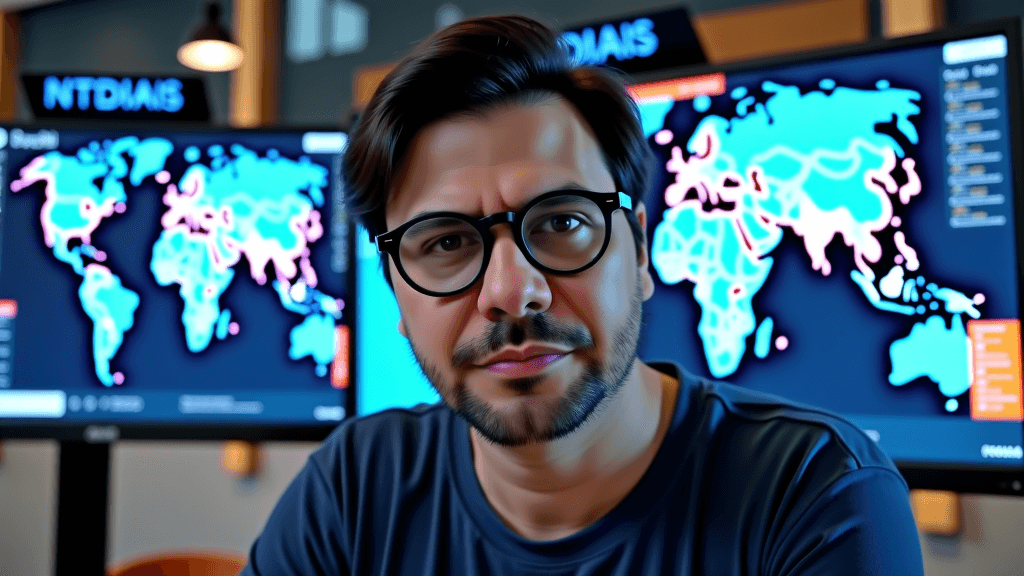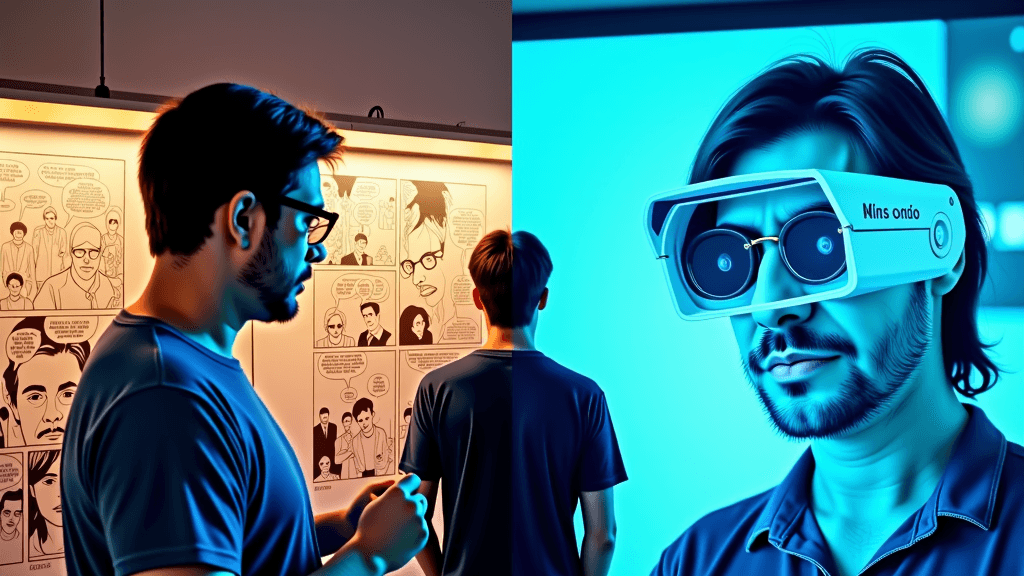AI Radar: From the Revolution in Medicine to the Transformation of Education — The Brazilian Panorama in 24h
June 1, 2025 | by Matos AI

The last day was marked by significant advances in the field of artificial intelligence, with impacts ranging from drug discovery to education and the job market. This edition of the AI Radar provides an in-depth analysis of how these transformations are shaping our society and how we can position ourselves strategically in the face of them.
AI in Healthcare: Accelerating Drug Discovery
The most impactful news of the last 24 hours comes from the pharmaceutical sector. Generative AI is emerging as a transformative force in drug discovery, a field historically characterized by long cycles, high costs and low success rates.
According to Jefferies Brokerage Analysis, the average drug development cycle traditionally spans 8 to 10 years, with success rates below 10% and costs exceeding US$1.4T billion per drug. The big news is that AI has the potential to reduce risks by more than 50%, accelerating timelines, improving the probability of success and reducing costs.
Join my WhatsApp groups! Daily updates with the most relevant news in the AI world and a vibrant community!
- AI for Business: focused on business and strategy.
- AI Builders: with a more technical and hands-on approach.
The trend is already visible across the industry, with major pharmaceutical companies, contract research organizations and emerging biotechs integrating AI into various stages of development. This is a clear example of how the technology can positively impact society, saving lives and reducing healthcare costs.
At the same time, discussions about regulating AI in healthcare are gaining momentum. According to a report by O Povo, while new technologies significantly transform diagnostic and treatment practices, regulatory challenges arise that need to be addressed to ensure the protection of patient data.
The Educational Revolution: From China to Brazil
The second prominent theme comes from the educational field, where two significant movements attract attention. China has announced a true revolution in its education system, with the implementation of mandatory teaching of Artificial Intelligence in primary and secondary schools from September 2025.
According to a report by Brasil 247, the plan will be implemented in three stages, integrating AI into various disciplines. The objective is clear: to empower the younger generations for the new technological era, ensuring the country's competitiveness on the global stage.
In Brazil, while we are still debating how to integrate AI into schools, the private sector is taking a step forward. The Virtual School, from the Bradesco Foundation, is offering free online courses with certification in partnership with Microsoft. Classes focus on developing artificial intelligence skills, from basic concepts to advanced modules.
At the same time, Brazilian educators are beginning to discuss how to integrate AI into the school environment. Guilherme Cintra, in an interview with UOL, states that “it is not healthy to pretend that AI does not exist” and advocates the creation of a broad debate on how to use it in the classroom.
The comparison between the Chinese and Brazilian approaches is revealing. While China has a coordinated national strategy, in Brazil initiatives are still fragmented and rely more on the private sector. This difference in approach could have significant consequences for the competitiveness of our professionals in the future.
The Future of Work: Adaptation or Obsolescence?
The third block of news deals with the impact of AI on the world of work, with strong statements and extreme cases. Nicolai Tangen, CEO of Norway's sovereign wealth fund (the largest in the world), has stated that those who do not use AI will never be promoted. For him, adapting to technology is crucial to maintaining competitiveness.
This position, coming from one of the largest asset managers on the planet, should be understood as a clear signal: Adapting to AI tools is no longer optional for those who want to advance in their careers.
At the extreme end of the spectrum, we have the controversial case of Klarna. After laying off 700 employees to be replaced by AI, the company's CEO now uses an AI avatar to present results. This case raises profound questions about the devaluation of human labor and the limits of automation.
The creative sector also faces its own anxieties. A handbook has been developed to help creative professionals adapt to the changes brought about by AI, seeking to calm insecurities in the sector.
Technological Advances: The New Tools
Finally, the last 24 hours have also brought news in terms of AI tools. Google has launched Veo 3, an AI that allows you to create videos from text commands. Presented at Google I/O 2025, the technology has advanced capabilities for generating high-resolution videos, including the synthesis of voices and ambient sounds.
This tool promises to revolutionize digital content production, making capabilities that were previously only available to large studios accessible to individual creators. It’s yet another example of how AI is democratizing access to sophisticated production tools.
Analysis: What Do These Movements Mean?
Looking at all of this news, I identify three main trends:
- Accelerating innovation in traditional sectors: Medicine and education, historically conservative fields, are undergoing profound transformations driven by AI.
- Polarization of the labor market: We are seeing approaches ranging from valuing complementarity between humans and AI to extreme cases of total replacement.
- Democratization of advanced capabilities: Tools like Google's Veo 3 put capabilities into the hands of individuals that were previously the preserve of large corporations.
As a professional who has worked in technology and innovation for over two decades, I see that we are at a critical juncture. Organizations and professionals who can strategically integrate AI into their processes will be well positioned to thrive, while those who resist change risk becoming obsolete.
The case of drug discovery is particularly inspiring. Here we have a clear example of how AI can not only improve efficiency but also generate significant social value by accelerating the development of life-saving treatments.
On the other hand, cases like Klarna remind us that we need to maintain a critical and humanistic view of the implementation of AI. Technology should be used to enhance human capabilities, not simply replace them.
Brazil's Role in This Scenario
Comparing Brazilian news with international news, I realize that we are still in an early stage of strategic adoption of AI. While China is implementing a national AI education plan and large global corporations are integrating the technology into their core processes, in Brazil we are still in the experimentation and discussion phase.
At the same time, there are positive signs. Initiatives such as the free courses offered by Fundação Bradesco in partnership with Microsoft show that there is a movement to democratize knowledge about AI in the country. And the debate on how to integrate technology into education, although still in its infancy, is already happening.
In my mentoring work with startups and established companies, I have observed a growing interest in implementing AI solutions, but there is still a significant gap between interest and effective implementation. Brazilian organizations need to accelerate their learning curve to avoid falling behind in the global competition.
Conclusion: Preparing for the Future
The panorama of the last 24 hours shows us that AI is rapidly transforming several sectors of the economy and society. To successfully navigate this new scenario, professionals and organizations need to:
- Continuously invest in AI education and updates
- Identify specific opportunities for applying technology in your fields of activity
- Develop a critical vision that allows you to discern between applications that generate real value and passing fads
- Cultivate the human skills that will become even more valuable in the age of AI: creativity, critical thinking, emotional intelligence, and collaboration
The news about the record R$27.3 billion loss of Brazilian state-owned companies, although not directly related to AI, reminds us of the importance of innovation and operational efficiency. In a context of limited resources, the intelligent implementation of technological solutions can be a way to reverse negative scenarios like this.
In my mentoring work with companies and startups, I have helped organizations identify concrete AI application opportunities that generate real return on investment. The key is to find the balance between ambition and pragmatism, implementing solutions that solve real problems and generate measurable value.
What are the next steps for your organization? How are you personally preparing for this future that has already arrived? The answers to these questions can determine your success in the years to come.
✨Did you like it? You can sign up to receive 10K Digital's newsletters in your email, curated by me, with the best content about AI and business.
➡️ Join the 10K Community here
RELATED POSTS
View all



